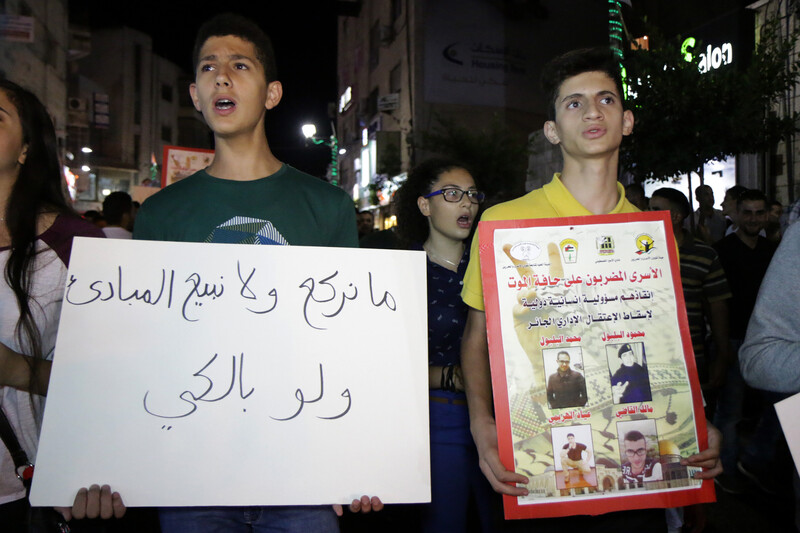Rights and Accountability 13 September 2016

Palestinians rally in support of hunger-striking prisoners held by Israel, in the occupied West Bank city of Ramallah, on 11 September.
ActiveStillsIsrael’s high court has upheld a law that allows the force-feeding of Palestinian prisoners on hunger strike.
The ruling issued on Sunday rejected petitions by several human rights groups and the Israeli Medical Association (IMA) that were filed last year after the law was passed.
There are currently three Palestinian prisoners on hunger strike, two of whom have refused food for more than 60 days, while the third is approaching 60 days.
The high court ruled force-feeding is constitutional, despite the global medical opinion that the practice is “never ethically acceptable,” as stated in the World Medical Association’s Malta Declaration.
The Malta Declaration forbids forced medical treatment and pressure to end a hunger strike. It also instructs physicians that their primary obligation is to their individual patient, not their employing authority.
The Israeli Medical Association, a member of the World Medical Association, directed its members to ignore orders to force-feed after the law passed in July 2015.
“This is a case in which medical ethics unequivocally trump the law, and the message we wish to convey to physicians is that forced feeding is tantamount to torture and that no doctor should take part in it,” IMA chair Dr. Leonid Eidelman stated on a previous occasion.
But Israeli justices Elyakim Rubinstein, Noam Sohlberg and Meni Mazuz found that a hunger striker “is not an ordinary patient but a person who knowingly and willingly places himself in a dangerous situation as a protest or a means of attaining a personal or public goal.”
The justices added that a hunger strike has “implications that go beyond the personal matter of the hunger striker.”
The ruling echoes an earlier statement from Gilad Erdan, when he was interior minister campaigning for the law, who described hunger strikes as “a new type of suicide terror attack.”
Nearly all hunger strikers protest their administrative detention – imprisonment without charge or trial – a practice adopted from British colonial laws. Over the last year, the number of administrative detainees in Israeli custody has increased.
Jawad Boulos, director of the Palestinian Prisoners’ Club legal department, said the ruling demonstrates that the Israeli high court will not deliver justice to Palestinians. He emphasized that hunger strikes are one of the “most important methods of resistance.”
Tamar Zandberg, a member of the Israeli parliament with the leftist Zionist Meretz party, called the law “cruel, immoral [and] unethical” and said it would not be implemented by any doctor. “The law is intended to be defiant and intimidating, not to be enacted in practice,” Zandberg stated.
Though several Palestinian prisoners have undertaken hunger strikes that brought them perilously close to death since the law was passed, Israeli hospitals have yet to forcibly feed anyone.
However, in January, a medical team at the civilian HaEmek hospital, forcibly treated Muhammad al-Qiq with an IV administering minerals and salts after nearly two months on hunger strike.
Still on strike
Last week, the high court temporarily suspended the administrative detention orders of three hunger strikers, Malik al-Qadi, and Mahmoud and Muhammad Balboul.
Their detention orders may be reinstated, however, if their conditions improve. All three have refused to end their strikes until their administrative detention orders are completely canceled.
Twenty-five-year-old al-Qadi, who has refused food since 16 July, fell into a coma on 9 September.
A journalism and media student at the West Bank’s al-Quds University in Abu Dis, al-Qadi was detained on 23 May, shortly after he was released from four months of detention.
The temporary lifting of the administrative detention order allowed the International Committee of the Red Cross to facilitate a visit between the Balboul brothers and their mother on Sunday.
However, due to Mahmoud’s fragile state of health, he remained asleep during her visit.
Earlier video footage shows a visibly weak and tearful Mahmoud speaking to his mother by phone from his hospital bed.
Mahmoud and Muhammad Balboul have been on hunger strike since 5 and 7 July, respectively. They were arrested together on 9 June in a raid on their house.





